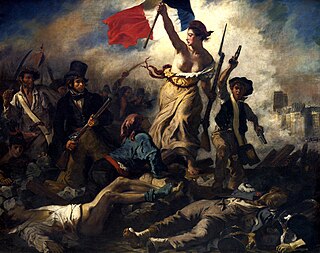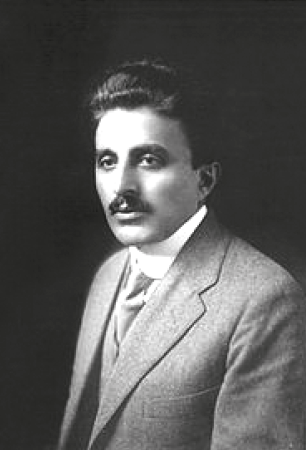Related Research Articles

Edward Bellamy was an American author, journalist, and political activist most famous for his utopian novel Looking Backward. Bellamy's vision of a harmonious future world inspired the formation of numerous "Nationalist Clubs" dedicated to the propagation of his political ideas.
Nationalism is an idea or movement that holds that the nation should be congruent with the state. As a movement, it presupposes the existence and tends to promote the interests of a particular nation, especially with the aim of gaining and maintaining its sovereignty (self-governance) over its perceived homeland to create a nation-state. It holds that each nation should govern itself, free from outside interference (self-determination), that a nation is a natural and ideal basis for a polity, and that the nation is the only rightful source of political power. It further aims to build and maintain a single national identity, based on a combination of shared social characteristics such as culture, ethnicity, geographic location, language, politics, religion, traditions and belief in a shared singular history, and to promote national unity or solidarity. There are various definitions of a "nation", which leads to different types of nationalism. The two main divergent forms are ethnic nationalism and civic nationalism.

Romantic nationalism is the form of nationalism in which the state claims its political legitimacy as an organic consequence of the unity of those it governs. This includes such factors as language, race, ethnicity, culture, religion, and customs of the nation in its primal sense of those who were born within its culture. It can be applied to ethnic nationalism as well as civic nationalism. Romantic nationalism arose in reaction to dynastic or imperial hegemony, which assessed the legitimacy of the state from the top down, emanating from a monarch or other authority, which justified its existence. Such downward-radiating power might ultimately derive from a god or gods (see the divine right of kings and the Mandate of Heaven).
A genre of arts criticism, literary criticism or literary studies is the study, evaluation, and interpretation of literature. Modern literary criticism is often influenced by literary theory, which is the philosophical analysis of literature's goals and methods. Although the two activities are closely related, literary critics are not always, and have not always been, theorists.

Gerald Robert Vizenor is an American writer and scholar, and an enrolled member of the Minnesota Chippewa Tribe, White Earth Reservation. Vizenor also taught for many years at the University of California, Berkeley, where he was Director of Native American Studies. With more than 30 books published, Vizenor is Professor Emeritus at the University of California, Berkeley, and Professor of American Studies at the University of New Mexico.
Postcolonial literature is the literature by people from formerly colonized countries, originating from all continents except Antarctica. Postcolonial literature often addresses the problems and consequences of the decolonization of a country, especially questions relating to the political and cultural independence of formerly subjugated people, and themes such as racialism and colonialism. A range of literary theory has evolved around the subject. It addresses the role of literature in perpetuating and challenging what postcolonial critic Edward Said refers to as cultural imperialism.

Pan-Turkism or Turkism is a political movement that emerged during the 1880s among Turkic intellectuals who lived in the Russian region of Kazan (Tatarstan), South Caucasus and the Ottoman Empire, with its aim being the cultural and political unification of all Turkic peoples. Turanism is a closely related movement but it is a more general term, because Turkism only applies to Turkic peoples. However, researchers and politicians who are steeped in the pan-Turkic ideology have used these terms interchangeably in many sources and works of literature.
Native American studies is an interdisciplinary academic field that examines the history, culture, politics, issues, spirituality, sociology and contemporary experience of Native peoples in North America, or, taking a hemispheric approach, the Americas. Increasingly, debate has focused on the differences rather than the similarities between other ethnic studies disciplines such as African American studies, Asian American studies, and Latino/a studies.
The Native American Renaissance is a term originally coined by critic Kenneth Lincoln in the 1983 book Native American Renaissance to categorise the significant increase in production of literary works by Native Americans in the United States in the late 1960s and onwards. A. Robert Lee and Alan Velie note that the book's title "quickly gained currency as a term to describe the efflorescence on literary works that followed the publication of N. Scott Momaday's House Made of Dawn in 1968". Momaday's novel garnered critical acclaim, including the Pulitzer Prize for Fiction in 1969.

Ameen Rihani (Amīn Fāris Anṭūn ar-Rīḥānī; Arabic: أمين الريحاني / ALA-LC: Amīn ar-Rīḥānī; November 24, 1876 – September 13, 1940) was a Lebanese-American writer, intellectual and political activist. He was also a major figure in the mahjar literary movement developed by Arab emigrants in North America, and an early theorist of Arab nationalism. He became an American citizen in 1901.
Ganesh Narayandas Devy is an Indian cultural activist, literary critic and former professor of English. He is known for the People's Linguistic Survey of India and the Adivasi Academy created by him. He is credited with starting the Bhaashaa research and Publication Centre. He writes in three languages—Marathi, Gujarati and English. His first full-length book in English is After Amnesia (1992). He has written and edited close to ninety books in areas including Literary Criticism, Anthropology, Education, Linguistics and Philosophy.
Craig Womack is an author and professor of Native American literature. He self-identifies as being of Creek and Cherokee descent, but is not enrolled with any Native American tribe. Womack wrote the book Red on Red: Native American Literary Separatism, a book of literary criticism which argues that the dominant approach to academic study of Native American literature is incorrect. Instead of using poststructural and postcolonial approaches that do not have their basis in Native culture or experience, Womack claims the work of the Native critic should be to develop tribal models of criticism. In 2002, Craig won Wordcraft Circle Writer of the Year Winner. Along with Robert Allen Warrior, Jace Weaver and Greg Sarris, Womack asserted themselves as a nationalist, which is part of an activist movement. The movement significantly altered the critical methodologies used to approach Native American literature.
Louis Dean Owens was a novelist and scholar who claimed Choctaw, Cherokee, and Irish-American descent. He is known for a series of Native-themed mystery novels and for his contributions to the then-fledgling field of Native American Studies. He was also a professor of English and Native American studies, and frequently contributed articles, literary criticism and reviews to periodicals. Owens died by suicide in 2002.
Left-wing nationalism or leftist nationalism is a form of nationalism which is based upon national self-determination, popular sovereignty, and left-wing political positions such as social equality. Left-wing nationalism can also include anti-imperialism and national liberation movements. Left-wing nationalism often stands in contrast to right-wing politics and right-wing nationalism.
Indigenism can refer to several different ideologies that seek to promote the interests of indigenous peoples. The term is used differently by various scholars and activists, and can be used purely descriptively or carry political connotations. There are a range of ways to define Indigenous identity, including political, legal, cultural, and geographic distinctions. Indigenism can be in some cases seen as ethnic nationalism.

Bangladeshi nationalism is a conservative form of civic nationalism that promotes the territorial identity of Bangladeshis. It originated as an ideology that emerged during the late 1970s and popularized by former President Ziaur Rahman. The history of nationalism in the country dates back to the colonial era, when the region started witnessing anti-colonial movements against the British Empire. Soon, a sense of religious nationalism began to emerge that later revolutionised into an ethnonationalism that was the driving force behind the East Bengali liberation war in East Pakistan and the emergence of independent Bangladesh in 1971. However, authoritarian and dictatorial rule and alienation of ethnic minorities post-independence led later leaders to espouse a more democratic civic form of nationalism based on territorial attachment of the people. When army chief Ziaur Rahman came to power, he sought to invigorate state policy and began to promote Bangladeshi nationalism. Politically, Bangladeshi nationalism is mainly professed by the center-right and rightist political parties in Bangladesh, led by Bangladesh Nationalist Party.
Ethnosymbolism is a school of thought in the study of nationalism that stresses the importance of symbols, myths, values and traditions in the formation and persistence of the modern nation state.
Ethnic nationalism, also known as ethnonationalism, is a form of nationalism wherein the nation and nationality are defined in terms of ethnicity, with emphasis on an ethnocentric approach to various political issues related to national affirmation of a particular ethnic group.
Robert Warrior, is a scholar and Hall Distinguished Professor of American Literature and Culture at the University of Kansas. With Paul Chaat Smith, he co-authored Like a Hurricane: The Indian Movement from Alcatraz to Wounded Knee. He is generally recognized, along with Craig Womack, as being one of the founders of American Indian literary nationalism. Warrior served as president of the American Studies Association from 2016 to 2017.

The Choctaw Youth Movement (CYM) was a Choctaw nationalist grassroots movement born in the late 1960s in response to efforts by the federal government to terminate the Choctaw Nation. It was formed, in part, as a tribal-centric movement to counter the Pan-Indianism of other Native rights groups, such as the American Indian Movement. As opposed to AIM, the Choctaw Youth Movement practiced non-confrontational, peaceful activism, and advocated cultural revitalization and the re-adoption of tribal language, and taking pride in the distinctness of being Choctaw. The defense of the tribal culture and history took precedence over maintaining inter-tribal alliances.
References
- ↑ Elvira Pulitano, Toward a Native American Critical Theory (Lincoln: Nebraska UP, 2003) p. 13